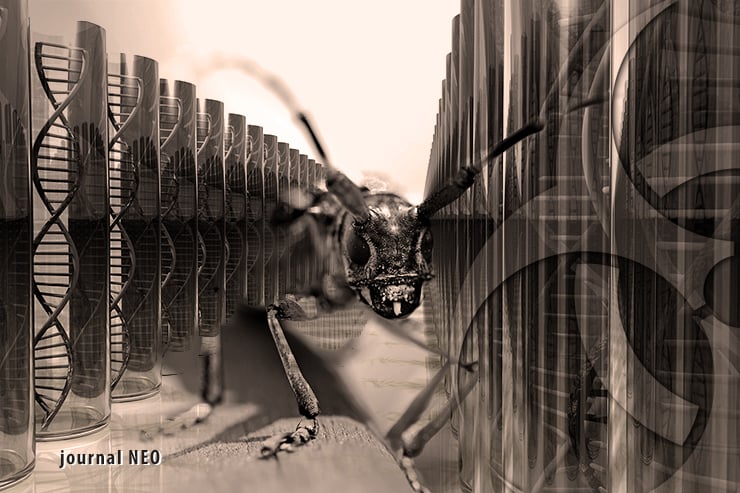by F. William Engdahl, Global Research:

There is strong evidence that the Pentagon, through its research and development agency, DARPA, is developing genetically modified insects that would be capable of destroying agriculture crops of a potential enemy. The claim has been denied by DARPA, but leading biologists have sounded the alarm on what is taking place using new “gene-editing” CRISPR technology to in effect weaponize insects. It’s like a 21st Century update of the Biblical plague of locusts, only potentially far worse.
The Pentagon Defense Advanced Research Projects Agency, DARPA, is funding a program with the bizarre name “Insect Allies.” Dr. Blake Bextine of DARPA describes the program as “leveraging a natural and efficient two-step delivery system to transfer modified genes to plants: insect vectors and the plant viruses they transmit.” DARPA claims the program is to provide “scalable, readily deployable, and generalizable countermeasures against potential natural and engineered threats to the food supply with the goals of preserving the US crop system.” Check the language: scalable, readily deployable…
TRUTH LIVES on at https://sgtreport.tv/
Under the DARPA project, Genetic Alteration Agents or viruses will be introduced into the insect population to directly influence the genetic makeup of crops. DARPA plans to use leaf hoppers, white flies, and aphids to introduce select viruses into crops. Among other dubious claims they say it will help farmers combat “climate change.” What no one can answer, especially as neither the Pentagon nor the US FDA are asking, is how will the genetically engineered viruses in the insects interact with other microorganisms in the environment? If crops are constantly being inundated by genetically modified viruses, how could this could alter the genetics and immune systems of humans who depend on the crops?
Bio-warfare alarm
Since most of the present US food supply is contaminated with toxic Roundup and other herbicides and pesticides along with GMO plants, one might doubt the honesty of the Pentagon statements of concern for the present US crop system. A group of European scientists have published a scientific paper in the October 5 issue of Science magazine, whose lead author is Dr. Guy Reeves of the Max Planck Institute for Evolutionary Biology, Plön, Germany.
The paper notes that the DARPA “Insect Allies” program, “aims to disperse infectious genetically modified viruses that have been engineered to edit crop chromosomes directly in fields.” This is known as “horizontal inheritance,” as opposed to the dominant vertical method of GMO alteration that make laboratory-generated modifications into target species’ chromosomes to create GMO plant varieties. The genetic alterations to the crops would be carried out by “insect-based dispersion” in free nature.
The European scientists point out that no compelling reasons have been presented by DARPA for the use of insects as an uncontrolled means of dispersing synthetic viruses into the environment. Furthermore, they argue that the Insect Allies Program could be more easily used for biological warfare than for routine agricultural use.
“It is very much easier to kill or sterilize a plant using gene editing than it is to make it herbicide or insect-resistant,” according to Guy Reeves at the Max Planck Institute.
The Science article points out that there has been no scientific discussion, let alone oversight, of the safety of such methods of gene-editing in open fields or even whether there are any benefits at all. The US Department of Agriculture flatly rejects any health or safety testing of gene-edited plants or insects. “As a result, the program may be widely perceived as an effort to develop biological agents for hostile purposes and their means of delivery, which—if true—would constitute a breach of the Biological Weapons Convention (BWC).” So far $27 million US taxpayer dollars have been spent on “Insect Allies.”
Unstable technology
Though details are not available, it is most certain that the Insect Allies gene-editing project with CRISPR-Cas tools utilizes what is called “gene drive.” Gene Drive which is also being heavily funded by the Pentagon’s DARPA, with gene-editing, aims to force a genetic modification to spread through an entire population, whether of mosquitoes or potentially humans, in just a few generations.
The scientist who first suggested developing gene drives in gene editing, Harvard biologist Kevin Esvelt, has publicly warned that development of gene editing in conjunction with gene drive technologies has alarming potential to go awry. He notes how often CRISPR messes up and the likelihood of protective mutations arising, making even benign gene drives aggressive. He stresses, “Just a few engineered organisms could irrevocably alter an ecosystem.” Esvelt’s computer gene drive simulations calculated that a resulting edited gene “can spread to 99 percent of a population in as few as 10 generations, and persist for more than 200 generations.”
Despite what Bill Gates, a major funder of gene-editing, may claim, gene-editing is not a precise technology in any sense. In China scientists used human embryos given by donors of embryos that could not have resulted in a live birth, to edit a specific gene. The results were a bad failure, as the tested cells failed to contain the intended genetic material. Lead researcher Jungiu Huang told Nature. “That’s why we stopped. We still think it’s too immature.”



